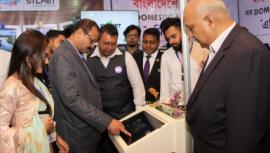$850m WB-ADB loans for education, health

Bangladesh yesterday signed loan agreements worth $850 million with the two largest multilateral development partners—Asian Development Bank and World Bank—for primary education, health and fishing sectors.
A $500 million loan deal was signed with the ADB to support Bangladesh's Fourth Primary Education Development Programme (PEDP 4), which aims to provide quality education to all children from pre-primary to grade 5.
Another $240 million financing agreement was signed with the World Bank to help improve management and production in marine and coastal fisheries and aquaculture.
The Sustainable and Marine Fisheries Project will help improve fisheries management systems, infrastructure, value chain investments and encourage private sector investment to increase the availability and quality of sea fish.
Kazi Shofiqul Azam, senior secretary of the Economic Relations Division, and Manmohan Parkash, country director of ADB, signed the deal at a ceremony held at the ERD conference room in Dhaka.
Azam and Zahid Hussain, acting country director of the World Bank, signed the deal for the $240 million financing deal.
“Proper and timely utilisation of the loan is a challenge,” Azam said.
Yesterday was the last working day for Azam, as he is retiring on October 27.
He went on to request the officials concerned to be more careful for proper implementation of the projects.
“The assistance for PEDP 4 will help improve primary education quality, equity, access and retention,” Parkash said.
The PEDP 4 is expected to directly benefit 18.6 million students, and about 340,000 teachers and more than 65,000 schools that are under the management of the primary and mass education ministry.
The programme aims to: reduce double-shift operations at schools by recruiting more teachers and building more classrooms; step up teacher education and provide needs-based training for teachers and teacher educators; reform examinations and assessments as well as enrich teaching and learning resources such as with digital materials, according to an ADB statement.
The total cost of the PEDP 4 programme is $14.7 billion, of which the government will provide $13.2 billion. The ADB, the World Bank, United Nations Children's Fund and the European Union will provide $1.38 billion.
The government and the ADB signed another loan agreement for $110 million in additional loan for a project that is improving access to urban primary healthcare services in Bangladesh through public-private partnerships (PPPs).
The additional financing will cover the cost of a five-year extension to assist the government to strengthen local health systems and continue to expand the PPP model of contracting to service providers, according to the ADB statement.
The Urban Climate Change Resilience Trust Fund, financed by the Rockefeller Foundation and the governments of Switzerland and the UK, will provide a $2 million grant, to be administered by the ADB, it said.
The Bangladesh government will contribute $30 million towards the cost of the additional financing, while the United Nations Population Fund will provide $1.5 million in-kind technical support. The project completion date is March 2023.
The current project covers 10 cities and four municipalities representing about 17 percent of the total 57 million urban population.
According to a review in 2015, the project has been providing services to more than 23 million clients, of whom 74 percent were female and has constructed a network of 180 health facilities and 224 satellite clinics.
The project is also building experience in the management and contracting of health service delivery as well as monitoring and evaluation systems.
The review concluded that the project merits continuation and expansion to ensure that the growing demand for healthcare in urban areas is met.
The project is recognised as an innovative model of partnership between the government, which contracts out health service delivery, and service providers (mainly nongovernmental organisations). As originally financed in 2012 with a $50 million ADB loan and $20 million co-financing, it is one of the largest PPP projects for primary healthcare delivery in South Asia. The rate of interest on the ADB loans is 2 percent and they would have to be repaid in 25 years, including a five-year grace period.
The Sustainable and Marine Fisheries Project will also support reforms in fisheries policies and regulations, according to the WB statement.
In 16 coastal districts, the project will set up community co-management associations with fishing communities, enabling them to adopt supplementary and alternative livelihoods.
While empowering fishing communities, especially women through skills development and nutrition awareness, the project will also establish 100 model fishing villages.
The rate of interest on the WB loan is 2.5 percent, including a service charge of 0.75 percent, interest rate of 1.25 percent and commitment charge 0.5 percent.
The rate is much higher than in previous WB loans, which carried 0.75 percent increase. The reason for the spike in interest rate is Bangladesh's higher per capita income now. The new rate became applicable for loan agreements signed after July 1.
The loan is repayable in 30 years, including a five-year grace period.
